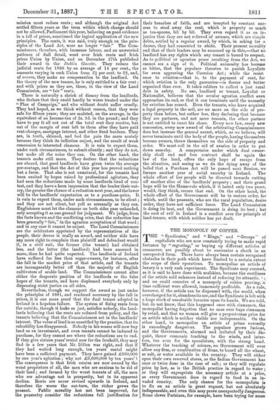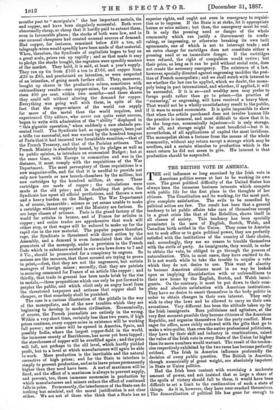THE MONOPOLY OF COPPER.
THE" Syndicates," and "Rings," and " Groups " of capitalists who are now constantly trying to make rapid fortunes by " regrating," or buying up different articles of commerce, are possibly about to encounter a check in an unexpected form. There have always been certain recognised obstacles in their path which have limited to a certain. extent the scope of their operations. To monopolise an article of luxury is a very rash experiment. The Syndicate may succeed, as it is said to have done with sealskins, because the costliness of the article sold enhances instead of reducing its attractio, • ; and we could conceive of a monopoly of rubies proving, it time sufficient were allowed, immensely profitable. As a rule, however, if the article can be dispensed with, the world, when overcharged for it, abandons its use, and the Syndicate is left with a huge stock of unsaleable luxuries upon its hands. We are told, but do not know, that this happened once with cinnamon, the monopolist having forgotten that no man ever bays cinnamon by retail, and that no woman will give a preposterous price for an article which is neither visible nor indispensable. On the other hand, to monopolise an article of prime necessity
is exceedingly dangerous. The populace grows furious, and the Governments, alarmed and irritated by their dis- quiet, throw economic teaching to the winds, and inter- fere, too soon for the speculators, with the strong hand. Whatever the teaching of science, no Government will ever allow any firm, or combination of firms, to hoard all the wheat, or salt, or water available in the country. They will either open their own reserved stores, as the Indian Government has once or twice done in the case of salt ; or they will regulate price by law, as is the British practice in regard to water ; or they will expropriate the necessary article at a price, as every Government does in regard to food in an in- vaded country. The only chance for the monopolists is to fix on an article in great request, bat not absoliate indispensable, and even this may prove unexpectedly dangerous. Some clever Parisians, for example, have been trying for some months past to " manipulate " the less important metals, tin and copper, and have been singularly successfuL Both were abnormally cheap, so cheap that it hardly paid to extract them, even in favourable places ; the stocks of both were low, and in one unusual cheapness had created unusual sources of demand. Had copper, for instance, remained below £40 a ton, all telegraph-wires would speedily have been made of that material. When, therefore, the Syndicate of capitalists began to bay on a great scale, prices ran up rapidly ; and as that made it easy to pledge the stocks bought, the regraters were speedily masters of the market. They hold, it is said, at least a year's supply.
They ran up tin from £103 a ton to £1 66, and copper from £39 to £85, and proclaimed an intention, or were suspected of an intention, of going much further still. They, moreover, bought up shares in the productive mines, sometimes with extraordinary results—one copper-mine, for example, having risen 400 per cent. within two months—and these shares they could sell without altering the demand for copper. Everything was going well with them, in spite of the fact that the copper-miners of the world can supply far more of the metal than the world requires, and experienced City editors, who never can quite resist success, began to write with admiration of the " ability " displayed in " this gigantic operation," when soddenly a new obstacle pre- sented itself. The Syndicate had, as regards copper, been just a trifle too successful, and was warned by the hundred tongues of Paris that it had incurred two formidable enmities,—that of the French Treasury, and that of the Parisian artisans. The French Ministry is absolutely bound, by its pledges as well as by public opinion, to introduce an economical Budget ; but at the same time, with Europe in commotion and war in the distance, it must comply with the requisitions of the War Department. The most peremptory of those requisitions is a new magazine-rifle, and for that it is needful to provide not only new barrels or new breech-chambers by the million, but new cartridges by the hundred million, at once. These cartridges are made of copper ; the calculations were made at the old price ; and in doubling that price, the Syndicate has upset all official predictions, and thrown a new and a heavy burden on the Budget. The War Department is, of course, inexorable ; science as yet seems unable to make a cartridge without copper ; and the Ministry are furious. So are large classes of artisans. Paris is the grand factory of the world for articles in bronze, and of France for articles in copper ; and entire trades are apprehensive that work will either stop, or that wages will be reduced to make up for the rapid rise in the raw material. The popular papers therefore rage, the Syndicate is threatened with direct action by the Assembly, and a demand is even formulated that the chief promoters of the monopoly, under a provision in the French Code which in substance existed in our own laws down to 7 and 8 Vic., should be prosecuted for a conspiracy to engross. So serious are the menaces, that those accused are trying to prove in print,—first, that they are not the engrossers, but certain managers of foreign mines ; secondly, that they are patriots in securing command for France of an article like copper ; and thirdly, that trade in general has been made brisk by the rise in metals,—three propositions which can only be put forward to perplex the public, and which elicit only an angry howl from the threatened taxpayers and artisans that copper shall be cheaper, or that somebody shall be punished. The case is a curious illustration of the pitfalls in the way of the monopolists, and of the new troubles which they are beginning to develop in modern civilisation. Economically, of course, the French journalists are entirely in the wrong. Within a very short time, certainly less than two years, if high prices continue, every copper-mine in existence will be working full power; new mines will be opened in America, Spain, and possibly India, where the largest copper-field in the world, the immense county of Beerbhoom, has never yet been tapped ; the storehouses of copper will be overfilled again ; and the price will fall, not perhaps to the old level, which hardly yielded profit, but to a level at which manufacturers will again be able to work. More production is the inevitable and the natural corrective of high prices ; and for the State to interfere is simply to prevent production, and so to leave prices permanently higher than they need have been. A sort of maximum will be fixed, and the effect of a maximum is always to prevent supply, and prevent, too, those immense economies in production by which manufacturers and miners reduce the effect of continued fails in price. Permanently, the interference of the State can do nothing but mischief, and the moral justification is not clear either. We are not of those who think that a State has no
superior rights, and ought not even in emergency to requisi- tion or to impress. If the State is at stake, let it appropriate horses or seize sailors ; but then, the emergency must be real. It is only the pressing need or danger of the whole community which can justify a Government in confis- cating, or impressing, or otherwise breaking its own tacit agreements, one of which is not to interrupt trade ; and an extra charge for cartridges does not constitute either a pressing need or an immediate danger. If the cartridges were refused, the right of compulsion would revive ; but their price, so long as it can be paid without social ruin, does not create the necessary emergency. The existence of a law, however, specially directed against engrossing modifies the posi- tion of French monopolists ; and we shall watch with interest to see whether the law can be applied, which we doubt, the mono- poly being in part international, and whether, if applied, it will be successful. If it is so—and wealthy men may prefer to forego profit rather than go to prison—the practice of "cornering," or engrossing, will have received a heavy blow. That would not be a wholly unsatisfactory result to the public, if it were to sound economists. It is quite impossible to show that when the article purchased does not involve human life the practice is immoral, and most difficult to show that it is, in the long-ran, economically injurious—it is only storage, after all, and storage might be most beneficial—but it is, nevertheless, of all applications of capital the most invidious. The monopolist skims a fortune from the means of the whole community, without any return except a storage which may be needless, and a certain stimulus to production which is the exact return he did not mean to give. His interest is that production should be suspended.







































 Previous page
Previous page